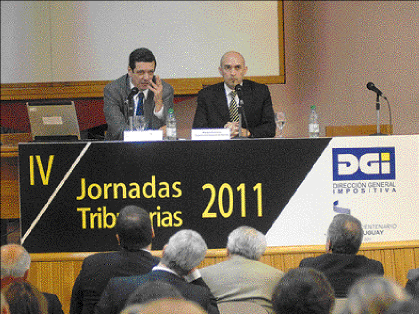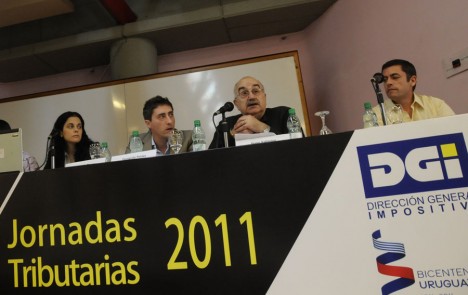An International Authority endorses requests for information from DGI
The CIAT Secretary called the Tax Authority to deepen data search
The initiative of the General Tax Directorate (DGI in Spanish) to demand information from taxpayers’ expenditures to schools and other educational and sport institutions, not only is in line with the practices performed in the region and in developed countries, but it should also be used by the Uruguayan Tax authority. The only secret which should limit the administrations is the tax secrecy.
So it was stated by Mr. Márcio Verdi, Executive Secretary of the Inter-American Center of Tax Administrations (CIAT), a public international organization that brings together 40 countries around the world.
On a visit to Uruguay for the IV Tax Sessions organized by the DGI at the Faculty of Economics in the University of the Republic, the expert spoke with “El Observador” about instruments which the tax authorities may use to fight against tax evasion.
For Verdi, the “worst tax for society is the one which is paid by one taxpayer and not by others”. In that sense, “everyone should support the tax authority to have the necessary tools to verify if everyone is paying what corresponds” he said.
The Tax expert and advisor to four government administrations in Brazil, said that those tax authorities that only use the information provided by taxpayers and their historical databases to carry out the tax collection control, “will never reach their full development and nor will they be able to verify that people pay what they should pay. ”
The Regulatory and Control of Personal Data Unit issued last week a favorable view about expanding the power of the DGI to demand from educational and sports institutions information on people who pay tuition and fees.
However, some private-sector experts point out that the mechanisms used by the local administration in order to obtain tax information infringe the right to privacy.
In the region as well as in Europe and North America, “all tax authorities have full access to the information. “That is not breaking anyone’s privacy”, categorically said Verdi.
The authorities should go beyond with the use of data provided by third parties, he said. “The Tax authority now has the absolute necessity of using information from financial transactions, credit cards, notary records,” he pointed out by way of example.
The creative use of databases which can be accessed by the DGI and the use of the latest technological instrumental are a worldwide trend and is being adopted also in Uruguay, explained the expert.
In fact, the DGI has already completed a data crossing between the luxury cars sales and the tax returns of their buyers, as well as real estate property transfers.
However, Verdi points out that there must be a clear counterpart from the DGI. The Tax Administration should ensure the confidentiality of the data. “The Tax authority should have access to all information, which should be treated confidentially, only for purposes of calculation and verification,” he explained.
For Mr. Verdi, the Uruguayan administration, together with Ecuador and Dominican Republic were the ones which registered the most progressed in terms of professionalization during the last decade at the regional level.
Personalized VAT
During the TAX Sessions, a group of researchers from the DGI Economic Advisory presented a series of research papers. One of them simulates the implementation of a personalized VAT, where each taxpayer pays a different rate, according to the position they hold in the distribution of income.
The research, which is in its final phase, shows that within a banking context, where access to financial instruments would be generalized to the families, through credit and debit cards – as well as companies – the possibility to perform operation with the plastic cards – the system is not only viable but it would allow to reduce the Gini index by 2.83 points, which measures inequality.
Sources from the Ministry of Economy (MEF) told “El Observador” that it is not only an academic exercise conducted by the researchers: It is a medium-and long-term goal for the administration to develop tools that individualize the tax burden and allow to deepen into the distributive policies.
Currently, VAT is a regressive tax. This means that once the tax is paid, the Uruguayans available income distribution becomes 1.03 points more unequal on the Gini index.
However, the study conducted by the technicians Gustavo González, Marcelo Montero, Leticia Olmos and Fernando Peláez determines that, once a personalized VAT is implemented, the tax would positively contribute to redistribution.
According to the researchers, the previous requirement for the application is universal access to financial services, because it would be implemented only on credit card and debit card purchases.
 |
 |
|
| Mr. Márcio F. Verdi, CIAT Executive Secretary and Mr. Paul Ferreri of the DGI, in the Seminar Tax Conference. | DGI experts in a panel of the Fourth Tax Conference |
